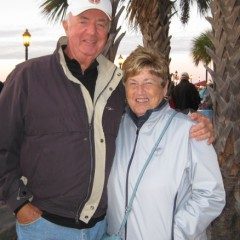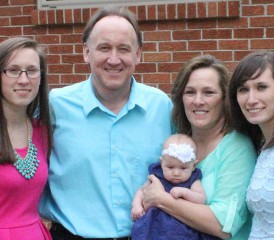Mesothelioma Survivor Holds Promise of Cure Through Clinical Trials

Fact Checked | Written by: Tim Povtak | Last Update: 10/24/2024 | 5 Min Read
Pleural mesothelioma survivor Jack Riordan sounds a lot more worried about those around him — his caregiver wife, children, grandchildren and other patients — than he does about himself.
Maybe that explains his strong belief in clinical trials. He wants to help others.
Riordan, 74, isn’t expecting any life-saving miracle from his treatment at the Florida Cancer Specialists in Sarasota. He merely is hoping that what researchers learn from his participation in the trial will move everyone closer to a future cure.
“Without thinking twice, I’d recommend a clinical trial to most everyone. By taking part, maybe it will give doctors some information to help others in the future,” Riordan told Asbestos.com from his home in southwest Florida. “I see a lot of time and money being put into mesothelioma research, so I think eventually, they will find something to control the disease. I’m glad to be part of that now.”
Riordan is part of a phase I, dose escalation trial of MSB0010718C. It’s an immunotherapy antibody targeting the protein PD-L1, which protects mesothelioma tumor cells from the body’s own immune system. The trial drug is expected to have anti-tumor activity by stopping PD-L1 and restoring immune system action.
The drug already has shown some success with metastatic breast cancer, metastatic colorectal cancer and non-small cell lung cancer. The PDL-1 and PD-1 proteins have become popular targets recently for a variety of immunotherapy drugs being tested at research centers nationally and globally.
Side Effects Don’t Deter Him
Riordan’s first treatment in November came with some tough side effects, which sidetracked him for more than a day. Yet he remained undeterred in his belief in the trial. He and his wife drive the 60 minutes to Sarasota every two weeks to participate.
“It really kicked me in the butt that first time. I thought I was freezing to death,” he said. “But I got over it. I can handle it. It’s either going to do me some good — maybe extend my life a little, which would be wonderful — or it’s not. And if it’s not, I can handle it. I’m a fatalist. When it’s your time to go, it’s time to go.”
Riordan was diagnosed in June, but it didn’t come as a complete surprise to him. He had spent much of his career working with asbestos insulation, doing asbestos abatement and general contracting. He worked in the Northeast, but relocated to Florida 18 years ago.
He was diagnosed 30 years ago with pleural plaques, an asbestos-related condition that can lead to mesothelioma. When the shortness of breath became an issue early this year, he knew it might be serious.
“Knowing what I knew made it a little easier for me to accept. I knew this was a possibility a long time before,” he said. “If I had worked in a grocery store all my life, it would have been devastating to hear. I was prepared.”
Worries More About His Family
Doctors told him the mesothelioma already had metastasized, eliminating most surgical options, leaving him with a 6- to 12-month prognosis. He underwent six chemotherapy sessions covering 18 weeks, but he stopped because of the negative effect on his white blood cells and bone marrow.
“This disease is tougher on families than it is for the patient. I’m just sick, not feeling well, but your whole family takes a bigger hit,” Riordan said. “It’s rough on a caregiver, in my case, my wife. There is a lot to be said for being the person responsible for the care of someone who has this disease. We have seven children, too, nine grandchildren and five great grandchildren. Quite a flock, and they’re all doing well. But they have their own lives to live.”

Physically, Riordan still looks relatively healthy, although his lifestyle has changed considerably in recent months, even if it has changed grudgingly. He was hitting golf balls on the driving range earlier this year when he tore his pleural drainage catheter in his side.
He was power washing his back porch one day and moving stone borders, but woke up the next day “feeling like I’d been run over by a truck.”
Adjusting His Lifestyle
“The hardest part for me is adjusting to the things I can’t do anymore. I was active my whole life, but now I’m limited to 15-minute walks with the dog,” he said. “I used to enjoy a good cocktail, drink a little beer, but now with the medication I’m taking, I can’t do that anymore.”
Riordan always overcame his medical problems in the past — triple bypass heart surgery and spinal fusion — but knows mesothelioma is different than any obstacle he has faced before.
“In the past, it was always, ‘if there’s a problem, we’ll fix it.’ This is almost impossible to fix,” he said. “But I’ve had 74 good years. I can’t think of anything bad that’s happened to me. If it wasn’t for this affliction, everything would be perfect. Overall, it’s not a great experience, but it’s a learning experience for me. And that’s life.”
Riordan has been an active participant in The Mesothelioma Center’s monthly support group conducted by Asbestos.com. He has made himself available to help and counsel newly diagnosed mesothelioma patients. He talks glowingly of the care he has received at the Florida Cancer Specialists treatment center.
He won’t know if the medication is having a positive effect until after the fourth treatment and the CT scan at the end of December. Still, he has remained as upbeat as ever.
“If you can gain a few months, a few weeks or even a few days from the trial, it’s worth it,” he said. “When I wake up in the morning, I always think, ‘let’s make it through another day, and see how it goes.’ Always think positive.”





